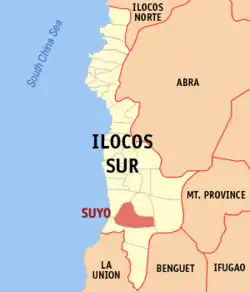Suyo | |
|---|---|
| Municipality of Suyo | |
 Rural view of Suyo | |
 Flag  Seal | |
 Map of Ilocos Sur with Suyo highlighted | |
OpenStreetMap | |
.svg.png.webp) Suyo Location within the Philippines | |
| Coordinates: 16°59′02″N 120°30′50″E / 16.9839°N 120.5139°E | |
| Country | Philippines |
| Region | Ilocos Region |
| Province | Ilocos Sur |
| District | 2nd district |
| Barangays | 8 (see Barangays) |
| Government | |
| • Type | Sangguniang Bayan |
| • Mayor | Mario B. Subagan |
| • Vice Mayor | Samuel B. Subagan Jr. |
| • Representative | Kristine Singson-Meehan |
| • Municipal Council | Members |
| • Electorate | 7,635 voters (2022) |
| Area | |
| • Total | 124.00 km2 (47.88 sq mi) |
| Elevation | 263 m (863 ft) |
| Highest elevation | 987 m (3,238 ft) |
| Lowest elevation | 32 m (105 ft) |
| Population (2020 census)[3] | |
| • Total | 10,766 |
| • Density | 87/km2 (220/sq mi) |
| • Households | 2,742 |
| Economy | |
| • Income class | 4th municipal income class |
| • Poverty incidence | 7.88 |
| • Revenue | ₱ 97.69 million (2020) |
| • Assets | ₱ 395.9 million (2020) |
| • Expenditure | ₱ 112.2 million (2020) |
| • Liabilities | ₱ 34.81 million (2020) |
| Service provider | |
| • Electricity | Ilocos Sur Electric Cooperative (ISECO) |
| Time zone | UTC+8 (PST) |
| ZIP code | 2715 |
| PSGC | |
| IDD : area code | +63 (0)77 |
| Native languages | Ilocano Tagalog |
| Website | www |
Suyo, officially the Municipality of Suyo (Ilocano: Ili ti Suyo; Filipino: Bayan ng Suyo), is a 4th class municipality in the province of Ilocos Sur, Philippines. According to the 2020 census, it has a population of 10,766 people.[3]
Suyo is 101 kilometres (63 mi) from the provincial capital Vigan and 333 kilometres (207 mi) from Manila.
Geography
Barangays
Suyo is politically subdivided into 8 barangays. [5] Each barangay consists of puroks and some have sitios.
- Baringcucurong
- Cabugao
- Man-atong
- Patoc-ao
- Poblacion (Kimpusa)
- Suyo Proper
- Urzadan
- Uso
Climate
| Climate data for Suyo, Ilocos Sur | |||||||||||||
|---|---|---|---|---|---|---|---|---|---|---|---|---|---|
| Month | Jan | Feb | Mar | Apr | May | Jun | Jul | Aug | Sep | Oct | Nov | Dec | Year |
| Mean daily maximum °C (°F) | 30 (86) |
31 (88) |
32 (90) |
33 (91) |
32 (90) |
31 (88) |
30 (86) |
30 (86) |
30 (86) |
31 (88) |
31 (88) |
30 (86) |
31 (88) |
| Mean daily minimum °C (°F) | 20 (68) |
21 (70) |
22 (72) |
24 (75) |
25 (77) |
25 (77) |
25 (77) |
25 (77) |
24 (75) |
23 (73) |
22 (72) |
21 (70) |
23 (74) |
| Average precipitation mm (inches) | 27 (1.1) |
31 (1.2) |
40 (1.6) |
71 (2.8) |
207 (8.1) |
237 (9.3) |
286 (11.3) |
261 (10.3) |
261 (10.3) |
254 (10.0) |
88 (3.5) |
46 (1.8) |
1,809 (71.3) |
| Average rainy days | 9.4 | 9.3 | 12.7 | 17.0 | 25.4 | 26.8 | 27.4 | 26.1 | 25.0 | 21.0 | 15.5 | 10.6 | 226.2 |
| Source: Meteoblue (modeled/calculated data, not measured locally)[6] | |||||||||||||
Demographics
|
|
| ||||||||||||||||||||||||||||||||||||||||||||||||||||||
| Source: Philippine Statistics Authority[7][8][9][10] | ||||||||||||||||||||||||||||||||||||||||||||||||||||||||
In the 2020 census, Suyo had a population of 10,766.[3] The population density was 87 inhabitants per square kilometre (230/sq mi).
Economy
Government
Local government
Suyo, belonging to the second congressional district of the province of Ilocos Sur, is governed by a mayor designated as its local chief executive and by a municipal council as its legislative body in accordance with the Local Government Code. The mayor, vice mayor, and the councilors are elected directly by the people through an election which is being held every three years.
Elected officials
| Position | Name |
|---|---|
| Congressman | Kristine Singson-Meehan |
| Mayor | Mario B. Subagan |
| Vice-Mayor | Samuel B. Subagan Jr. |
| Councilors | Renato Ngangac |
| Philip Bistoyong | |
| Reginald Orpilla | |
| Norberto Licnad | |
| Nestor Arcinas | |
| Alejandro Ballada | |
| Timoteo Abalos | |
| Orlando Aglibot | |
References
- ↑ Municipality of Suyo | (DILG)
- ↑ "2015 Census of Population, Report No. 3 – Population, Land Area, and Population Density" (PDF). Philippine Statistics Authority. Quezon City, Philippines. August 2016. ISSN 0117-1453. Archived (PDF) from the original on May 25, 2021. Retrieved July 16, 2021.
- 1 2 3 Census of Population (2020). "Region I (Ilocos Region)". Total Population by Province, City, Municipality and Barangay. Philippine Statistics Authority. Retrieved 8 July 2021.
- ↑ "PSA Releases the 2018 Municipal and City Level Poverty Estimates". Philippine Statistics Authority. 15 December 2021. Retrieved 22 January 2022.
- ↑ "Province: Ilocos Sur". PSGC Interactive. Quezon City, Philippines: Philippine Statistics Authority. Retrieved 12 November 2016.
- ↑ "Suyo: Average Temperatures and Rainfall". Meteoblue. Retrieved 14 May 2020.
- ↑ Census of Population (2015). "Region I (Ilocos Region)". Total Population by Province, City, Municipality and Barangay. Philippine Statistics Authority. Retrieved 20 June 2016.
- ↑ Census of Population and Housing (2010). "Region I (Ilocos Region)" (PDF). Total Population by Province, City, Municipality and Barangay. National Statistics Office. Retrieved 29 June 2016.
- ↑ Censuses of Population (1903–2007). "Region I (Ilocos Region)". Table 1. Population Enumerated in Various Censuses by Province/Highly Urbanized City: 1903 to 2007. National Statistics Office.
{{cite encyclopedia}}: CS1 maint: numeric names: authors list (link) - ↑ "Province of Ilocos Sur". Municipality Population Data. Local Water Utilities Administration Research Division. Retrieved 17 December 2016.
- ↑ "Poverty incidence (PI):". Philippine Statistics Authority. Retrieved December 28, 2020.
- ↑ "Estimation of Local Poverty in the Philippines" (PDF). Philippine Statistics Authority. 29 November 2005.
- ↑ "2003 City and Municipal Level Poverty Estimates" (PDF). Philippine Statistics Authority. 23 March 2009.
- ↑ "City and Municipal Level Poverty Estimates; 2006 and 2009" (PDF). Philippine Statistics Authority. 3 August 2012.
- ↑ "2012 Municipal and City Level Poverty Estimates" (PDF). Philippine Statistics Authority. 31 May 2016.
- ↑ "Municipal and City Level Small Area Poverty Estimates; 2009, 2012 and 2015". Philippine Statistics Authority. 10 July 2019.
- ↑ "PSA Releases the 2018 Municipal and City Level Poverty Estimates". Philippine Statistics Authority. 15 December 2021. Retrieved 22 January 2022.
- ↑ "2022 National and Local Elections" (PDF). Commission on Elections. Retrieved March 11, 2022.
External links
- Pasyalang Ilocos Sur
- Philippine Standard Geographic Code
- Philippine Census Information
- Local Governance Performance Management System